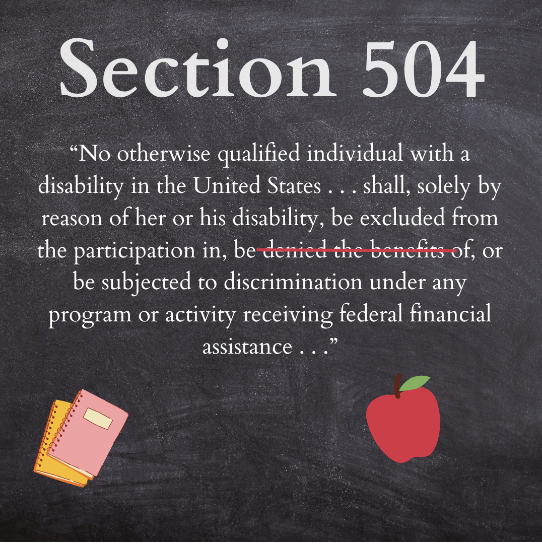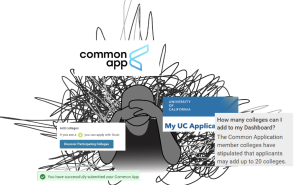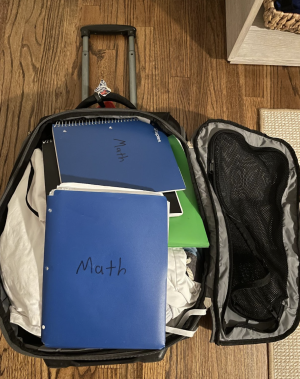Special education, 504 plans: administration doesn’t give adequate academic support

Students with 504 plans are entitled to specific educational services intended to aid them in receiving a “free appropriate public education (FAPE).” However, the school is not doing its job to ensure this.
My ADHD and anxiety had never proven to hinder my academic performance—that is, until I started high school.
Switching from all A-level classes to nearly all Honors, I not only had to adjust to the rigor and expectations of my classes, but I had to do so with the added interference of all of these neurological challenges. So I got a 504 plan.
According to the Connecticut State Department of Education, “Section 504 of the Rehabilitation Act of 1973 is a federal law designed to protect the rights of individuals with disabilities in programs and activities that receive federal financial assistance from the United States Department of Education.”
Essentially, students with 504 plans receive specific accommodations that fit their academic needs and provide the same quality of education as their peers. When my plan became official, an email was sent to all of my teachers. A number of them supported me during this new change, which filled me with a great sense of relief—momentarily.
Over the years, however, I have come to learn the shortcomings of my school district when it comes to providing students the assistance and services they need to receive an education that is equal and fair in comparison to their neurotypical counterparts.
First, teachers simply don’t know what their students’ accommodations are. In the three plus years I have had accommodations, most of my teachers have either only given me extended time on assessments (which is just one of my accommodations) or they haven’t given me anything. This forces students, like myself, to ask teachers to provide their accommodations, making them feel like they’re asking for favors or burdening their teachers even more. It makes them feel guilty—guilty for asking their teacher to have the same educational opportunities as everyone else. In these situations I have frequently found myself in, I typically avoid informing my teachers.
Having to ask or remind teachers of your accommodations can also seem unappealing because it could impact a teacher’s impression of you as a student. I am in no way accusing any teacher of discriminating against a student based on their disability, but merely alluding to the implicit bias we all possess. When I told my college counselor that I wanted to write an article about 504 plans, they told me that I shouldn’t talk about it because colleges might look down upon having ADHD—which (by the way), according to the National Institute of Mental Health, “ADHD occurs in an estimated 3 to 5 percent of preschool and school-age children. Therefore, in a class of 25 to 30 children, it is likely that at least one student will have this condition.”
So while one could, in general terms, agree that these such academic challenges do not imply lower intelligence or incompetence, at the end of the day, we’re all human and we’re not perfect.
And as if teachers not knowing about students’ 504 plans wasn’t bad enough, many students aren’t aware of some or any of the accommodations they have. I’ve had accommodations since the end of 9th grade and it wasn’t until a few months ago that I finally emailed my guidance counselor and asked for a list. I knew there were other accommodations that I wasn’t getting, I just didn’t know what they were. There’s no official document or location on PowerSchool where you can take a quick look at them. A friend of mine has gotten extra time since the end of their sophomore year and only found out what a 504 plan was halfway through junior year. If students have certain academic services but aren’t even aware of them, they’re not getting the assistance that they are legally entitled to.
Beyond inadequate efforts to ensure students’ 504 plans are being fully and accurately obeyed, student confidentiality is consistently neglected. Perhaps the most common breach of privacy I’ve observed is when teachers create an assessment that allows for both regular and extended time students to complete their test within the same class period. When regular time students finish their tests, it’s pretty obvious to everyone which students have accommodations.
Student privacy is protected under the Family Educational Rights and Policy Act (FERPA) and Parts B and C of the Individuals with Disabilities Education Act (IDEA). In other words, privacy is a right, not an accommodation. When a teacher or administrator does anything that makes it clear to other students that a student has a 504 plan or an Individualized Educational Program (IEP) plan, they are in noncompliance for infringing confidentiality.
In order to ensure the same educational opportunities for all students and the protection of their individual rights, the school administration must take more aggressive action to better inform both teachers and students about these important, necessary services. Information on 504 plans—a student’s specific accommodations, what they are, how they should be implemented—must be more easily accessible. Only then can we live up to the level of educational quality Staples High School is known for.

Broadcast Director Anna Diorio ’23 entered Staples deeply hoping to become a part of something in the school community. Inklings proved to be a place...





















































Chola Priester • Jan 11, 2023 at 10:14 am
I’m having problems too with my daughters 504 plan. The accommodations that they put in there last week is still the same. They are giving the needed and necessary accommodations that my daughter needs . What else should I do in order for them to put those proper and needed accommodations for my daughter?